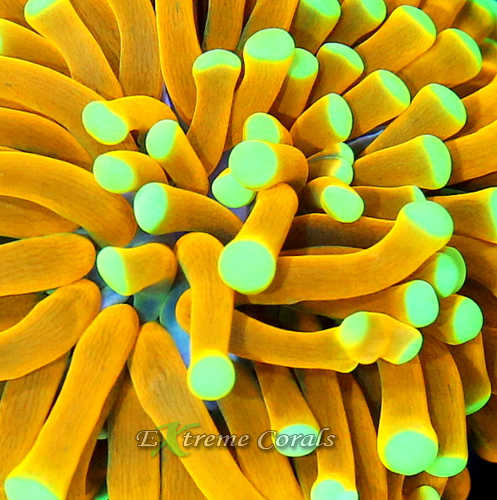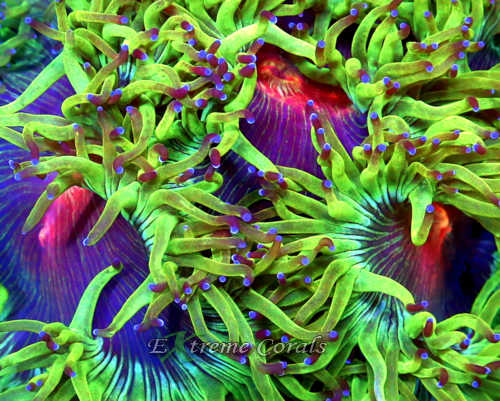Extreme Corals News and Updates
Navigating the World of Corals for Sale
Exploring the Coral Market: A Beginner's Handbook
Dive into the vibrant world of coral keeping with our comprehensive beginner's guide. Learn about the benefits of incorporating corals into your aquarium, factors to consider before purchasing, and essential tips for their care and maintenance. Whether you're a novice enthusiast or a seasoned aquarist, unlock the secrets to creating a thriving coral ecosystem in your own tank.
by scott Shiles • April 26, 2024
Understanding the basics of coral reefs

Coral reefs are diverse underwater ecosystems made up of tiny animals called polyps that build hard calcium carbonate structures. These structures form the intricate and colorful coral reefs that provide a home to numerous marine species. Coral reefs are vital because they support thousands of species, protect coastlines from erosion, and are a crucial part of the ocean ecosystem. Coral reefs cover less than 1% of the ocean floor, but they are home to about 25% of ocean life.
Benefits of keeping corals in your aquarium
Corals not only enhance the beauty of your aquarium but also provide a natural habitat for marine life. By keeping corals in your tank, you can create a vibrant and colorful underwater ecosystem. They help maintain water quality by absorbing harmful substances and providing oxygen for fish. Additionally, corals promote biodiversity in your aquarium, creating a more natural and balanced environment for your underwater pets.
Factors to consider before purchasing corals
Before purchasing corals, it's essential to consider factors like the size of your aquarium, the lighting requirements of the corals, and their compatibility with other organisms in your tank. Make sure to research the specific care needs of the coral species you are interested in, as some may require more attention than others. Water parameters such as temperature, salinity, and pH levels also play a crucial role in the health of corals. Additionally, consider the source of the corals to ensure they are ethically and sustainably sourced to help protect our marine ecosystems.
Different types of corals available for sale
Corals for sale come in Soft corals, LPS corals, and SPS corals. Soft corals are flexible and sway in the water current; LPS corals have hard skeletons with large polyps; SPS corals have small polyps and intricate calcium carbonate skeletons. Each type requires specific care and conditions, so it's essential to choose corals that suit your expertise level and tank setup.
Choosing the right corals for your tank
When choosing corals for your tank, consider factors like the lighting and water flow in your aquarium. Some corals require strong lighting, while others can thrive in lower light conditions. Additionally, certain corals prefer high water flow, while others do better in gentler currents. Research the specific needs of the corals you are interested in to ensure they will thrive in your tank environment. Consult with experienced aquarium enthusiasts or professionals for guidance on selecting the right corals for your setup.
Where to buy quality corals
You can find quality corals for sale at local fish stores or online coral vendors. Local fish stores often have a selection of corals at varying prices, and you can see them in person before purchasing. Online coral vendors offer a wide range of corals and may provide shipping options right to your doorstep. Ensure you research the reputation of the store or vendor and read reviews from other hobbyists to ensure you are getting healthy corals.
Best practices for maintaining healthy corals
When caring for your corals, ensure they receive proper lighting, water flow, and stable water parameters. Here are some best practices to maintain healthy corals:
Lighting: Provide appropriate lighting based on the types of corals you have. Ensure they receive the right spectrum and intensity for their growth.
Water Flow: Maintain good water flow in your aquarium to prevent detritus buildup and ensure corals receive essential nutrients.
Water Parameters: Regularly test and maintain stable water parameters such as temperature, salinity, pH, and nutrient levels to ensure optimal conditions for your corals' health.
Common problems and how to solve them
Corals can face various problems such as algae overgrowth, pests, and diseases. Here are some simple solutions to address these issues:
Algae Overgrowth: To combat algae growth, ensure proper water flow, limit the nutrients in the water, and consider introducing algae-eating species like hermit crabs or certain fish.
Pests: Pests like flatworms or Aiptasia can harm corals. Physically removing them or using specialized pest removal products can help.
Diseases: If your corals show signs of diseases like tissue recession or discoloration, quarantine the affected coral, observe closely, and treat with appropriate medication as recommended by experts.
Tips for successful coral care and growth
When caring for corals, it's crucial to maintain stable water conditions, as they are sensitive creatures. Here are some simple tips to help you successfully care for and grow your corals:
Regularly test water parameters such as temperature, salinity, pH, and nutrient levels to ensure they are within the proper range.
Provide adequate lighting for your corals, as different types require varying levels of light intensity.
Maintain proper water flow to simulate their natural environment and prevent debris buildup.
Regularly feed your corals with appropriate food, as they rely on both photosynthesis and supplemental feeding for nutrition.
Quarantine new corals before introducing them to your main tank to prevent the spread of diseases.
Observe your corals daily for any signs of stress or disease, acting promptly if any issues arise.
If you're new to buying corals, remember to start with easy-to-care-for coral species like Soft corals and LPS corals. These types are more forgiving and can help you get accustomed to caring for corals. Also, before making a purchase, ensure you have the right lighting, water flow, and water quality in your tank to support the corals you want. Lastly, don't hesitate to seek advice from experienced hobbyists or professionals in the field to ensure the well-being of your coral ecosystem.

